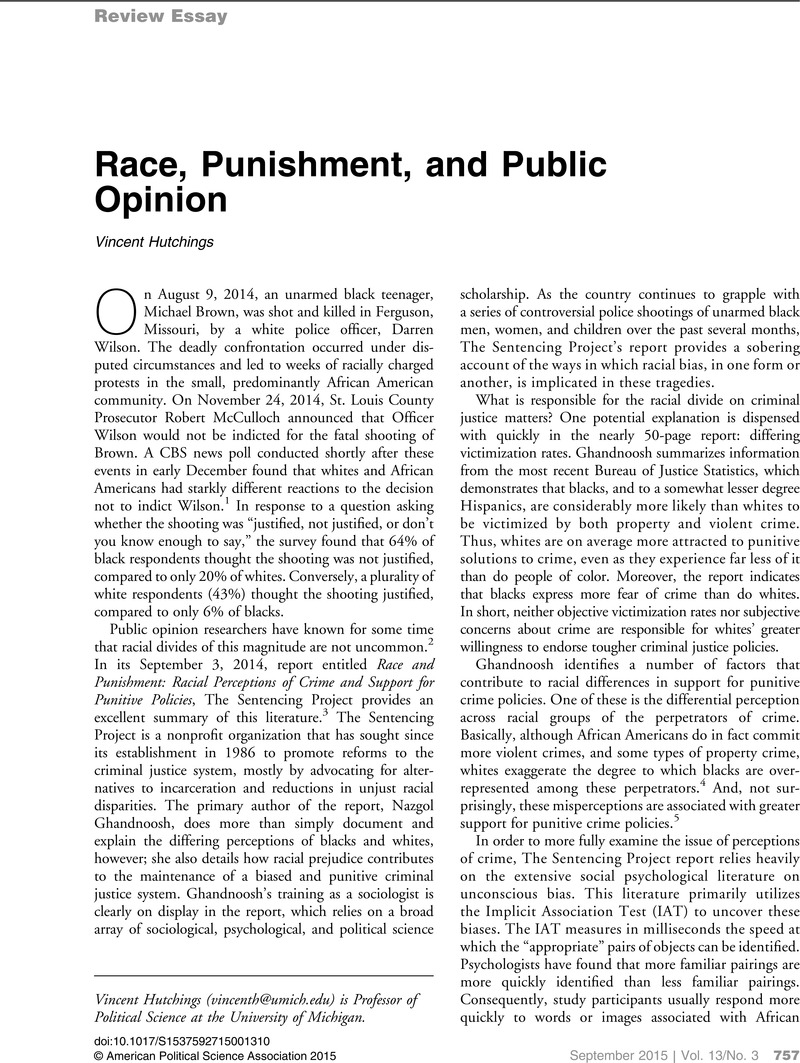Crossref Citations
This article has been cited by the following publications. This list is generated based on data provided by Crossref.
Hutton, Erica
2016.
Police Brutality, Racial Profiling, and Discrimination in the Criminal Justice System.
p.
296.
Baxter-Moore, Nick
Eagles, Munroe
Aheer, Dupinder
Maxwell, Racquel
Pilkey, Lisa-Anne
and
Samra, Kimmy
2016.
Explaining Canada–US Differences in Attitudes Toward Crime and Justice: An Empirical Test of S.M. Lipset’s Account.
American Review of Canadian Studies,
Vol. 46,
Issue. 4,
p.
430.
Crichlow, Vaughn J.
and
Fulcher, Christopher
2017.
Black Men Down: An Assessment of Experts’ Quotes on Deadly Encounters with Police.
Race and Social Problems,
Vol. 9,
Issue. 3,
p.
171.
Butler, Ryden
Nyhan, Brendan
Montgomery, Jacob M.
and
Torres, Michelle
2018.
Revisiting white backlash: Does race affect death penalty opinion?.
Research & Politics,
Vol. 5,
Issue. 1,
Jackson, Jenn M.
2019.
Black Americans and the “crime narrative”: comments on the use of news frames and their impacts on public opinion formation.
Politics, Groups, and Identities,
Vol. 7,
Issue. 1,
p.
231.
Hutton, Erica
2020.
Media Controversy.
p.
250.
Cole, Geneva
2020.
Types of White Identification and Attitudes About Black Lives Matter.
Social Science Quarterly,
Vol. 101,
Issue. 4,
p.
1627.
Jardina, Ashley
and
Piston, Spencer
2021.
Hiding in plain sight: Dehumanization as a foundation of white racial prejudice.
Sociology Compass,
Vol. 15,
Issue. 9,
Jardina, Ashley
and
Piston, Spencer
2022.
The Effects of Dehumanizing Attitudes about Black People on Whites’ Voting Decisions.
British Journal of Political Science,
Vol. 52,
Issue. 3,
p.
1076.
Israel-Trummel, Mackenzie
and
Streeter, Shea
2022.
Police Abuse or Just Deserts?.
Public Opinion Quarterly,
Vol. 86,
Issue. S1,
p.
499.
Jardina, Ashley
and
Piston, Spencer
2023.
The Politics of Racist Dehumanization in the United States.
Annual Review of Political Science,
Vol. 26,
Issue. 1,
p.
369.
Collins, Jonathan E.
2024.
They only hate the term: policy branding and the politics of critical race theory.
Journal of Public Policy,
Vol. 44,
Issue. 4,
p.
826.
Tesler, Michael
McThomas, Mary
and
Tung, Hans H.
2024.
The racialization of pit bulls: What dogs can teach us about racial politics.
PLOS ONE,
Vol. 19,
Issue. 6,
p.
e0305959.
Krishnamurthy, Arvind
Bram, Curtis
and
Nathan, Charles
2025.
The Punitive Public? Exploring the Opinion-Election Connection in Criminal Justice Policy.
American Politics Research,
Israel-Trummel, Mackenzie
2025.
Changing Attitudes and Provoking Action: Perspective-Taking Mobilizes White Americans for Prisoner Release.
Perspectives on Politics,
p.
1.



